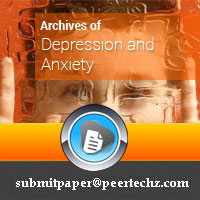Archives of Depression and Anxiety
Depression
Bernard Brusset*
Cite this as
Brusset B (2021) Depression. Arch Depress Anxiety 7(1): 010-011. DOI: 10.17352/2455-5460.000059In psychiatry, only descriptive semiology (DSM), and the effect of suggestion of naive clinical investigation that can result from it, leads to the proliferation of diagnoses in terms of" mono or bipolar of different types. They justify the prescription. of antidepressant treatment aimed at eliminating disabling symptoms, sometimes without any other form of psychopathological questioning The depressed person cannot work and is expensive: a disorder to be corrected as quickly as possible.
To conceive of depression as an organic disorder without personal significance implies the denial of meaning and meanings in the current and in the patient's history, limiting the investigation to the search for the family factor. In the opposite direction, it is in the logic of psychoanalytic investigation to suspend sociological and biological factors by centering on psychic activity in interrelation. The somatic dimension of depression, which is proven by the effectiveness of antidepressants, comes only as inhibition of thought, but the analyst cannot ignore the suffering and depressive slackening. Sooner or later the question arises of the advisability of psychiatric prescription [1].
Some psychoanalysts have judged antidepressants, considered drugs, as incompatible with psychoanalysis. Increasingly, however, it has become evident that the boost in energy produced by the well-dosed antidepressant makes analysis possible. It is not prescribed by the analyst so as not to interfere too much with the transference. A particularly delicate problem arises if depression, irreducible to interpretation, occurs during psychoanalysis and sometimes with a risk of suicide. It is necessary to take into account two epistemologically different domains, two different logics, and to take decisions which engage the ethical responsibility of the therapist in the questioning of the framework. In short, it is clear that one can no longer consider the theory of depression by ignoring the neurobiological dimension which provides the basis for antidepressant treatment. As the slowing down exists in so-called endogenous or so-called reactional depressions, it does not explain the depressive syndrome as a whole but one dimension, that which is objectified by the action of antidepressants on the cerebral levels of norepinephrine and serotonin. (The excess of serotonin in mania, impulsive behavior, and the deficit in the event of depressive slowing down). The ineffective pharmacological treatment of depression (and of psychoactive drugs in general), which questions the direct implication of NA and 5HT in this disorder (See inflammatory hypothesis of depression).
As a biological response, the depressive slowing down leads to the taking into account of the survival behaviors of the "emotional unconscious" which is of neurobiological determinism and of phylogenetic basis: outside sense, uninterpretable, non subjectivable. It is also necessary to conceive of its relations with the psychic inscriptions which are at the origin of the drive in the psychic organization as close as possible to its emergence in the primitive interrelationships of the mother-environment and the child: therefore the metapsychology of the sources of first subjectivation which is also the first objectization: affects and representations of things then of words.
The work of psychic elaboration in the treatment, to the extent of the transferential actualization of the depression (or of a "melancholic moment"), and by the answers given by the analyst, can put an end to the repetition compulsion fatal chronic or repeated depression. Unlike mood stabilizers, the process in analysis can transform the melancholic organization into a process of mourning, by the interpretation and awareness of the conflict of drive ambivalence and narcissistic identification (with incorporation of the lost object [2].
Attempts at psychotherapies involving taking narcotics at the time of the session have been made, in particular with psilocybin or LSD (and during the activism of Timothy Leary in California, author of "The Psychedelic Experience"). The results do not seem to have been very positive, especially because of serious risks. Transcranial Magnetic Stimulation (TMS) is the most recent direct action technique on the brain …
Psychopharmacological treatment is aimed at a group of symptoms and not at the person, which unbalances the balance in favor of psychotherapy versus psychopharmacology.
- Brusset B (2012) The anti-depressant in the treatment and ethics of the psychoanalyst, In Depression, Guy Cabrol et al. (dir), Paris, PUF.
- Freud S (1915) Mourning and melancholy. OCF.P. XIII, Paris, PUF, 1988. Widlöcher D. The logics of depression, Paris, Fayard, 1983,1995 (2nd ed.); The depressive slowdown (dir), Paris, PUF, 1983; Traite de psychopathologie, Paris PUF, 1994.
Article Alerts
Subscribe to our articles alerts and stay tuned.
 This work is licensed under a Creative Commons Attribution 4.0 International License.
This work is licensed under a Creative Commons Attribution 4.0 International License.

 Save to Mendeley
Save to Mendeley
